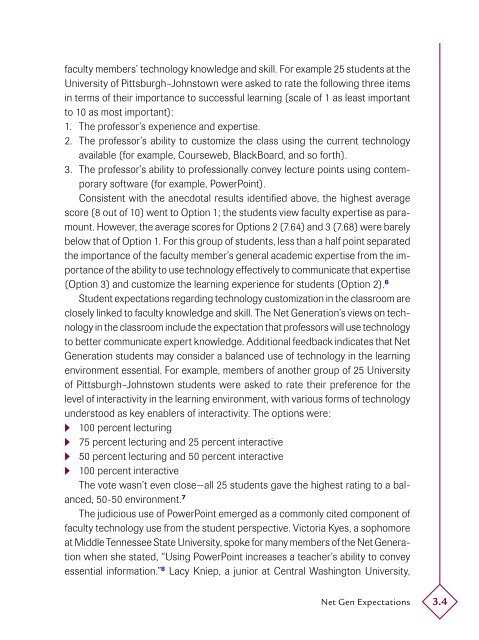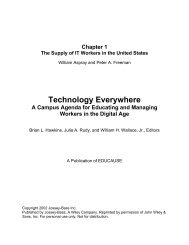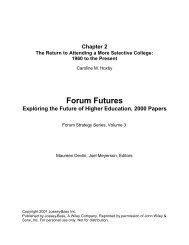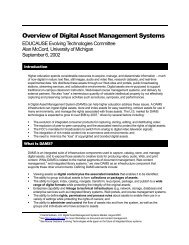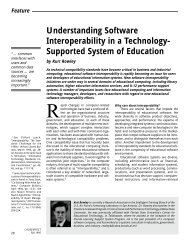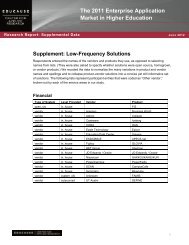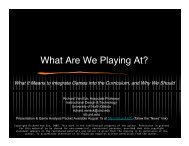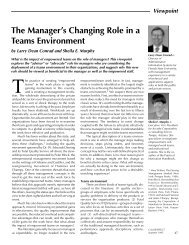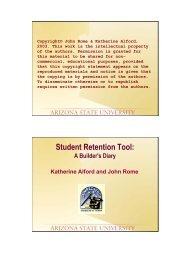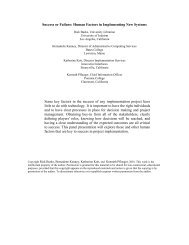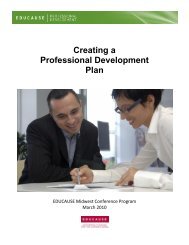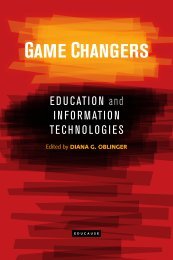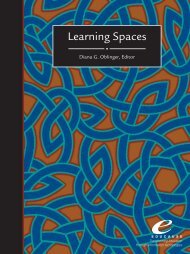Educating the Net Generation - Educause
Educating the Net Generation - Educause
Educating the Net Generation - Educause
Create successful ePaper yourself
Turn your PDF publications into a flip-book with our unique Google optimized e-Paper software.
faculty members’ technology knowledge and skill. For example 25 students at <strong>the</strong><br />
University of Pittsburgh–Johnstown were asked to rate <strong>the</strong> following three items<br />
in terms of <strong>the</strong>ir importance to successful learning (scale of 1 as least important<br />
to 10 as most important):<br />
1. The professor’s experience and expertise.<br />
2. The professor’s ability to customize <strong>the</strong> class using <strong>the</strong> current technology<br />
available (for example, Courseweb, BlackBoard, and so forth).<br />
3. The professor’s ability to professionally convey lecture points using contemporary<br />
software (for example, PowerPoint).<br />
Consistent with <strong>the</strong> anecdotal results identified above, <strong>the</strong> highest average<br />
score (8 out of 10) went to Option 1; <strong>the</strong> students view faculty expertise as paramount.<br />
However, <strong>the</strong> average scores for Options 2 (7.64) and 3 (7.68) were barely<br />
below that of Option 1. For this group of students, less than a half point separated<br />
<strong>the</strong> importance of <strong>the</strong> faculty member’s general academic expertise from <strong>the</strong> importance<br />
of <strong>the</strong> ability to use technology effectively to communicate that expertise<br />
(Option 3) and customize <strong>the</strong> learning experience for students (Option 2). 6<br />
Student expectations regarding technology customization in <strong>the</strong> classroom are<br />
closely linked to faculty knowledge and skill. The <strong>Net</strong> <strong>Generation</strong>’s views on technology<br />
in <strong>the</strong> classroom include <strong>the</strong> expectation that professors will use technology<br />
to better communicate expert knowledge. Additional feedback indicates that <strong>Net</strong><br />
<strong>Generation</strong> students may consider a balanced use of technology in <strong>the</strong> learning<br />
environment essential. For example, members of ano<strong>the</strong>r group of 25 University<br />
of Pittsburgh–Johnstown students were asked to rate <strong>the</strong>ir preference for <strong>the</strong><br />
level of interactivity in <strong>the</strong> learning environment, with various forms of technology<br />
understood as key enablers of interactivity. The options were:<br />
� 100 percent lecturing<br />
� 75 percent lecturing and 25 percent interactive<br />
� 50 percent lecturing and 50 percent interactive<br />
� 100 percent interactive<br />
The vote wasn’t even close—all 25 students gave <strong>the</strong> highest rating to a balanced,<br />
50-50 environment. 7<br />
The judicious use of PowerPoint emerged as a commonly cited component of<br />
faculty technology use from <strong>the</strong> student perspective. Victoria Kyes, a sophomore<br />
at Middle Tennessee State University, spoke for many members of <strong>the</strong> <strong>Net</strong> <strong>Generation</strong><br />
when she stated, “Using PowerPoint increases a teacher’s ability to convey<br />
essential information.” 8 Lacy Kniep, a junior at Central Washington University,<br />
<strong>Net</strong> Gen Expectations<br />
3.4


